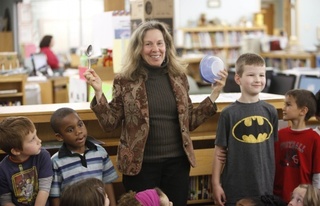In The News

Click the links below to read or hear:


DO YOU NEED HELP CONVINCING OTHERS ABOUT THE MERITS OF SCHOOLYARD GARDENS? CLICK ON THIS "TOOL KIT" TO SEE CURRENT RESEARCH AND GREAT WEB LINKS ABOUT THE EFFECTS OF SCHOOL GARDENS ON CHILDREN'S LEARNING, BEHAVIOR AND WELL-BEING.
TEN WAYS THAT A GARDEN CAN CHANGE YOUR CHILD'S LIFE
1. Your child will learn how good food can taste-- and she or he will EAT vegetables—because fresh home-grown vegetables TASTE GOOD!
2. A child who gardens is less likely to be overweight and at risk for obesity and diabetes. Your child will get exercise and be more active. Pick-axing, digging, planting and weeding are great exercise!
3. Your child’s cancer risk will be reduced. (Many pesticides cause cancer.) You reduce your child’s exposure to pesticide residue by growing your own organic vegetables. And a child who eats fresh vegetables has more resistance to cancer; studies have shown that many fresh vegetables. notably broccoli and leafy greens, have anti-cancer properties.
4. A garden will connect your child to Nature. A garden teaches children where their food comes from and how it grows.Your child will become more appreciative of the food she or he eats by realizing how it grows."School Gardens Take the 'Yuk" Factor out of Vegetables."
5. Gardening together bonds families together and is a wonderful family activity. To quote Alice Waters, " From the garden, and the kitchen, and the table, you learn empathy–for each other and for all of creation"...
By preparing, cooking and eating wonderful, flavorful fresh food, together...by going around the dinner table and expressing gratitude, we learn about what it is to care.
6. Your child will learn how birds and beneficial insects help a garden grow by pollinating or by helping get rid of insect pests. She or he will learn how to create habitat for other living things because planting a vegetable or flower garden creates habitat. Children will watch in wonderment as pollinators such as hummingbirds, butterflies and bees and other wildlife come to live in your own back yard. Your child will learn empathy for other living things.
7. A child has more fun in a school that uses a school garden to help teach. Students discover complex interactions on their own through an inquiry-based curriculum. By teaching through firsthand outdoor experience, both children and teachers have more fun while learning.
8. Your child’s achievement will most likely increase when school garden is part of the curriculum.
Studies such as the *SEER report show that teaching using the outdoor environment has been linked to elevated standardized test scores. Children retain the information they are taught when it has relevance to the real world.
9. Your child may thrive in a setting providing more physical activity while learning. If your child has been diagnosed with ADD (Attention Deficit Disorder) he or she may thrive in a garden setting. Children learn in different ways and some have trouble sitting still and learning by only listening and seeing (visual or auditory ways). Some children learn better through activity and through touch or smell (sensory or olfactory channels).
10. A Child who knows how to grow food becomes more self-sufficient. If, in the next 80 years of your child’s life, if there were a disruption of the channels of food distribution, your child would know how to grow her/his own.